December 4th Scots Book of Days 1214 William the Lion
 December 4 – 1214 William the Lion (William I King of Scots) died at Stirling Castle and was succeeded by his son Alexander II . [TG5-58]
December 4 – 1214 William the Lion (William I King of Scots) died at Stirling Castle and was succeeded by his son Alexander II . [TG5-58]
William I “The Lion” “the Rough’’ died. – William I of Scotland (a.k.a. William the Lion; born about 1143)
Sir Walter Scott discussed this king in his “History of Scotland” {Grandfather’s Tales). ‘William derived his cognomen of the Lion from his being the first who adopted that animal as the armorial bearing of Scotland. From this emblem the chief of the Scottish heralds is called Lion king at arms. Chivalry was fast gaining ground in Scotland at this time, as appears from the importance attached by William and his elder brother Malcolm to the dignity of knighthood, and also from the romantic exclamation of William, when he joined the unequal conflict at Alnwick, ” Now shall we see the best knights.”
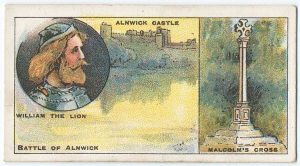 William the Lion was a legislator, and his laws are preserved. He was a strict administrator of justice; but the turn of the age and the temper of his subjects required, that justice should, in barbarous times seize her harvest with less selection. The blot of William’s reign was his rashness at [Battle of] Alnwick, a revolt against the England’s Henry II, which culminated in [William] being captured at the Battle of Alnwick (1174). [William] then bartered the independence of Scotland for his own liberty, and William pledged his allegiance to Henry, by signing the Treaty of Falaise (Normandy) in December of 1174. But his dexterous negotiation with Henry’s successor Richard the Lionheart [King of England] to release William of his pledge enabled [William] to recover that false step, as Richard was in need of funds to support his crusade in the Holy Lands. (See May 13 wherein is recorded that fictional clan McDuck funded the pledge). After much to do, William left his kingdom in the same condition in which he found it. By his wife, Ermengarde de Beaumont, William had a son, Alexander, who succeeded to him. By illicit [but public] intrigues he left a numerous family.’ (edited)
William the Lion was a legislator, and his laws are preserved. He was a strict administrator of justice; but the turn of the age and the temper of his subjects required, that justice should, in barbarous times seize her harvest with less selection. The blot of William’s reign was his rashness at [Battle of] Alnwick, a revolt against the England’s Henry II, which culminated in [William] being captured at the Battle of Alnwick (1174). [William] then bartered the independence of Scotland for his own liberty, and William pledged his allegiance to Henry, by signing the Treaty of Falaise (Normandy) in December of 1174. But his dexterous negotiation with Henry’s successor Richard the Lionheart [King of England] to release William of his pledge enabled [William] to recover that false step, as Richard was in need of funds to support his crusade in the Holy Lands. (See May 13 wherein is recorded that fictional clan McDuck funded the pledge). After much to do, William left his kingdom in the same condition in which he found it. By his wife, Ermengarde de Beaumont, William had a son, Alexander, who succeeded to him. By illicit [but public] intrigues he left a numerous family.’ (edited)
Alexander II becomes King of Scots – 1214. Alexander’s reign was never less than eventful. His tenure as king saw him invade England several times (getting as far south as Dover) and regain territories that had been lost for generations. Video: A history of Scotland: Hammers of the Scots.
http://www.bbc.co.uk/scotland/history/scotland_united/alexander_ii_becomes_king_of_scots/
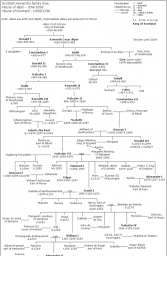 Houses of Alpin (834-1058) and Dunkeld (1058-1290) Wikipedia.
Houses of Alpin (834-1058) and Dunkeld (1058-1290) Wikipedia.
1371 Reginald III, Duke of Guelders died, uncle of William I of Guelders and Jülich, and 3rd great uncle of Marie of Guelders, Queen of Scots. After William I’s death, his only brother Reginald IV succeeded him as duke of a united Jülich and Guelders-Zutphen . Reginald was less warlike, although tensions continued with Cleves over Lymers and Zevenaar, and the town of Emmerich was ceded to Cleves. Upon the death of Reginald, also without issue, the Duchy of Jülich went to Adolf, Duke of Jülich-Berg, son of William VII of Jülich, 1st Duke of Berg, and grandson of Gerhard VI of Jülich, Count of Berg and Ravensberg, brother of William’s father. The Duchy of Guelders-Zutphen went to Arnold of Egmond, son of Maria van Arkel, daughter of William’s sister, Joanna, and Count John XII of Arkel.
1424 Treaty of London, releasing James I (Stewart King of Scots) from his 18 years captivity in England.
1543 – sometime in December- John Knox, James Hamilton, Duke of Châtellerault, the appointed regent for the infant Mary, Queen of Scots had decided with the Queen mother, Mary of Guise and Cardinal David Beaton to persecute the Protestant sect that had taken root in Scotland.
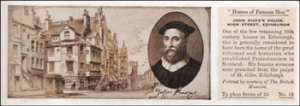 JOHN KNOX’S HOUSE, HIGH STREET, EDINBURGH One of the few remaining 16th century houses in Edinburgh, this is generally considered to have been the home of the great reformer and historian who established Protestantism in Scotland. His famous sermons were preached from the pulpit of St. Giles, Edinburgh.
Portrait by courtesy of The British Museum.
JOHN KNOX’S HOUSE, HIGH STREET, EDINBURGH One of the few remaining 16th century houses in Edinburgh, this is generally considered to have been the home of the great reformer and historian who established Protestantism in Scotland. His famous sermons were preached from the pulpit of St. Giles, Edinburgh.
Portrait by courtesy of The British Museum.
www.englishteastore.com/typhoo-history-cards-set
1585 John Willock One of 24 Lords of the Congregation. (c. 1515 – December 4, 1585), Scottish reformer, was a native of Ayrshire and was educated at the University of Glasgow. Willock began to preach and in 1559 was outlawed. Popular sympathy, however, rendered this sentence fruitless, and in the same year, being Knox’s deputy as minister of St Giles’ Cathedral, Edinburgh, he frustrated the efforts of the regent [Mary of Guiseto Queen Dowager) restore the Roman Catholic religion, and administered the communion for the first time in accordance with the ideas of the reformers. He was one of the four ministers chosen by the convention of October 1559 to seats on the council of government, and was one of those appointed to compile the First Book of Discipline About 1562 he became rector of All Saints Church, Loughborough in Leicestershire, but he retained his connection with the Scottish church and was Moderator of the General Assembly of the Church of Scotland in 1562, and again in 1564, in 1565 and in 1568.
1609 – Alexander Hume, Scottish poet died.
1649 – William Drummond of Hawthornden, Scottish poet (b. 1585) died.
- Drummond of Cargill Stubhall Perth 8th c 2Hamilton2Stewart 2miller2Simmons 2Choate zoe
1694 The Darien Colony sometime in December.
The scheme was at length offered to the merchants of London, the only traders probably in the world who, their great wealth being seconded by the protection of the British navy, had the means of realizing the splendid visions of Paterson. But when the projector was in London, endeavouring to solicit attention to his plan, he became intimate with the celebrated Fletcher of Saltoun. This gentleman, one of the most accomplished men, and best patriots, whom Scotland has produced in any age, had, nevertheless, some notions of her interests which were more fanciful than real, and, in his [Sir Walter Scott’s Tales of a Grandfather-59-30] anxiety to render his country service, did not sufficiently consider the adequacy of the means by which [Scotland’s] welfare was to be obtained.
[Paterson] was dazzled by the vision of opulence and grandeur which Paterson unfolded, and thought of nothing less than securing, for the benefit of Scotland alone, a scheme which promised to the state which should adopt it, the keys, as it were, of the New World. The projector was easily persuaded to give his own country the benefit of his scheme of colonization, and went to Scotland along with Fletcher. Here the plan found general acceptation, and particularly with the Scottish administration, who were greatly embarrassed at the time by the warm prosecution of the affair of Glencoe, and who easily persuaded King William II, that some freedom and facilities of trade granted to the Scots, would divert the public attention from the investigation of a matter, not very creditable to his Majesty’s reputation any more than to their own. Stair, in particular, a party deeply interested, gave the Darien scheme the full support of his eloquence and interest, in the hope to regain a part of his lost popularity.
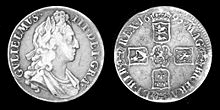 Silver crown coin of William III, dated 1695. The Latin inscription is (obverse) GVLIELMVS III DEI GRA[TIA] (reverse) MAG[NAE] BR[ITANNIAE], FRA[NCIAE], ET HIB[ERNIAE] REX 1695. English: “William III, By the grace of God, King of Great Britain, France, and Ireland, 1695.” The reverse shows the arms, clockwise from top, of England, Scotland, France, and Ireland, centered on William’s personal arms of the House of Orange-Nassau.
Silver crown coin of William III, dated 1695. The Latin inscription is (obverse) GVLIELMVS III DEI GRA[TIA] (reverse) MAG[NAE] BR[ITANNIAE], FRA[NCIAE], ET HIB[ERNIAE] REX 1695. English: “William III, By the grace of God, King of Great Britain, France, and Ireland, 1695.” The reverse shows the arms, clockwise from top, of England, Scotland, France, and Ireland, centered on William’s personal arms of the House of Orange-Nassau.
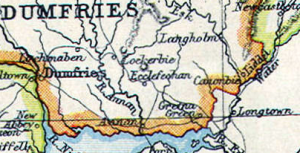 1795 – Thomas Carlyle, Scottish writer and historian (d. 1881) born. Best known for his “French Revolution” born in Ecclefechan.
1795 – Thomas Carlyle, Scottish writer and historian (d. 1881) born. Best known for his “French Revolution” born in Ecclefechan.
I’ve read the History of the French Revolution and it is a must reading. Carlyle’s style is tight, with a specialty of his use of the metaphors which he sprinkles two or three to a page, without duplication.
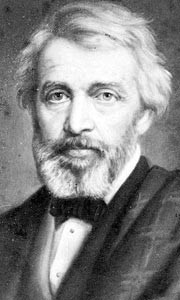 Thomas Carlyle, from the Scottish Lowlands, in 1837 wrote the great masterpiece of historical writing, The French Revolution. Garner on Language and Writing By Bryan A. Garner (2009) cites both Carlyle and Scott as good examples of writing.
Thomas Carlyle, from the Scottish Lowlands, in 1837 wrote the great masterpiece of historical writing, The French Revolution. Garner on Language and Writing By Bryan A. Garner (2009) cites both Carlyle and Scott as good examples of writing.
- Carlyle Carleil Carlisle 1501 2Semple2Montgomerie 2Cochrane2Miller 2Simmons2Choate zoe blair5 TG
1831 Joseph Smith the Prophet, at Kirtland, Ohio, (clan Mack of Inverness, Malcolm King of Scots), Doctrine and Covenants 72. It is required of the Lord, at the hand of every asteward, to render an account of his stewardship, both in time and in eternity.
- Archibald Gracie 4th died, from trauma and exposure. Returning home from his extended tour of Europe, Gracie took first class passage on the Titanic at Southampton. His saga during the sinking of the Titanic is recorded in his book published after his death called “The Truth About the Titanic.” Born in Mobile, Alabama, in 1859, his father was confederate General Archibald Gracie 3rd who died at Petersburg December 1864. A graduate of St. Paul’s Academy in Concord, New Hampshire and of West Point Military Academy, Gracie 4th became attached to the Seventh Regiment, United State Army. The Colonel spent seven years of his life writing a book, “The Truth About Chickamauga,” one of the great battles of the Civil War. Gracie 4th’s great Grandfather, the 1st, was from Dumfries Scotland. educated in Heidelberg, Gracie Mansion, the New York City Mayor’s residence, was from this Gracie family.
http://chicagoscots.net/HC%20Newsletters/2009%20July.htm
1939 – World War II: HMS Nelson battleship, is struck by a mine (laid by U-31) off Loch Ewe, the Scottish coast and is laid up for repairs until August 1940.
 1948 “My Bunny Lies over the Sea” movie with Stan Laurel and Oliver Hardy features Scottish folk song My bonnie Lies over the Ocean. Wikipedia- Obscure origin may be Charles Edward Stuart (‘Bonnie Prince Charlie’) after the defeat of the Prince at the Battle of Culloden in 1746 and his subsequent exile. My Bonnie lies over the ocean
1948 “My Bunny Lies over the Sea” movie with Stan Laurel and Oliver Hardy features Scottish folk song My bonnie Lies over the Ocean. Wikipedia- Obscure origin may be Charles Edward Stuart (‘Bonnie Prince Charlie’) after the defeat of the Prince at the Battle of Culloden in 1746 and his subsequent exile. My Bonnie lies over the ocean
My Bonnie lies over the sea
My Bonnie lies over the ocean
Oh, bring back my Bonnie to me…
Bring back, bring back
Oh, bring back my Bonnie to me, to me
Bring back, bring back
Oh, bring back my Bonnie to me.
 Bugs Bunny gets lost when he is tunneling to his vacation spot. He accidentally ends up in Scotland, and mistakes a Scotsman named Angus MacRory dressed in traditional clothes and playing the bagpipes for a lady.
Bugs Bunny gets lost when he is tunneling to his vacation spot. He accidentally ends up in Scotland, and mistakes a Scotsman named Angus MacRory dressed in traditional clothes and playing the bagpipes for a lady.
The plot includes a round of golf. ‘’ On the first hole, Bugs focuses on swinging the ball, looks down at MacRory for tapping his foot impatiently which he hides behind himself and smiles at him nervously as he is distracting Bugs, and upon his first stroke missing the hole, digs another, bigger one to earn a hole in one (with the real one shown in the distance). Bugs then nails MacRory’s ball to the tee so it won’t go anywhere, although MacRory still gets a hole in one anyway, to Bugs’ protests. At hole 8, MacRory laughs at Bugs whose ball has fallen shorter of the hole than MacRory’s. Bugs however turns his club into a pool cue and pots the ball into the hole, causing MacRory to break his club in half in anger. Later, after being seen hitting his ball out of a bunker multiple times to get his ball in hole 16, Bugs figures out (through imaginary sums in the air) how many hits it took. He says he got 2 strokes on the hole. MacRory, not believing Bugs at all, corrects him: “Two? FIFTY-FIVE!” An auction ensues until MacRory gives Bugs a hole in one as his “final offer”.
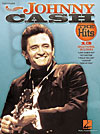 1956, Elvis Presley visits Carl Perkins in the studio of Sam Phillips with Jerry Lee Lewis backing him on piano. Cash started an impromptu jam session. Phillips left the tapes running and the recordings, half gospel songs, survived and have since been released under the title Million Dollar Quartet. Miller, Stephen (2003). Johnny Cash: The Life of an American Icon. Omnibus. ISBN 0-7119-9626-1. Johnny Cash Descends from the Cash of Fife, and Malcolm 1.
1956, Elvis Presley visits Carl Perkins in the studio of Sam Phillips with Jerry Lee Lewis backing him on piano. Cash started an impromptu jam session. Phillips left the tapes running and the recordings, half gospel songs, survived and have since been released under the title Million Dollar Quartet. Miller, Stephen (2003). Johnny Cash: The Life of an American Icon. Omnibus. ISBN 0-7119-9626-1. Johnny Cash Descends from the Cash of Fife, and Malcolm 1.
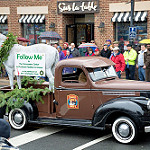 2003 Janet Michelle Cook born. (clan Ogilvie, Ramsay, Ross, Rutherford, Ruthven)
2003 Janet Michelle Cook born. (clan Ogilvie, Ramsay, Ross, Rutherford, Ruthven)
 2014 SCOTTISH CHRISTMAS WALK WEEKEND 2014.
2014 SCOTTISH CHRISTMAS WALK WEEKEND 2014.
2015 The Campagna Center presents the 45th Annual Scottish Christmas Walk  Weekend & Parade on December 4-6, 2015. Warm your heart with holiday cheer and join a full lineup of festivities that celebrates the rich Scottish heritage of Old Town Alexandria, Virginia.
Weekend & Parade on December 4-6, 2015. Warm your heart with holiday cheer and join a full lineup of festivities that celebrates the rich Scottish heritage of Old Town Alexandria, Virginia.
http://www.campagnacenter.org/scottishwalkweekend
Disclaimer: The author of each article published on this web site owns his or her own words. The opinions, beliefs and viewpoints expressed by the various authors and forum participants on this site do not necessarily reflect the opinions, beliefs and viewpoints of Utah Standard News or official policies of the USN and may actually reflect positions that USN actively opposes. No claim in public domain or fair use. © John Choate
Utah Standard News depends on the support of readers like you.
Good Journalism requires time, expertise, passion and money. We know you appreciate the coverage here. Please help us to continue as an alternative news website by becoming a subscriber or making a donation. To learn more about our subscription options or make a donation, click here.
To Advertise on UtahStandardNews.com, please contact us at: ed@utahstandardnews.com.


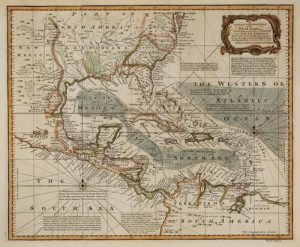
Comments - No Responses to “December 4th Scots Book of Days 1214 William the Lion”
Sure is empty down here...